Mediterranean Diet Grocery and Shopping List
By Mediterranean Living
Updated September 17, 2025
The Mediterranean diet is less of a diet and more of a lifestyle. It includes mostly plant-based foods; measured quantities of dairy, meat, and seafood; and daily physical activity for a happy, healthy life.
The Mediterranean diet originates from the countries bordering and countries surrounding the Mediterranean Sea, including key Mediterranean countries such as Italy, Greece, and Turkey. There is no single Mediterranean diet; instead, a variety of eating patterns and traditions are shared among these regions. The Mediterranean diet is eating based on traditional regional cuisine, focusing on nutrient-rich ingredients like fruits, vegetables, whole grains, legumes, healthy fats, and seafood. The benefits of the Mediterranean diet include positive effects on heart health, healthy aging, and chronic disease prevention. These Mediterranean diet’s benefits are widely supported by health authorities.
This diet includes a lot of plant-based foods. But what should your grocery list include? How should you stock up your pantry?
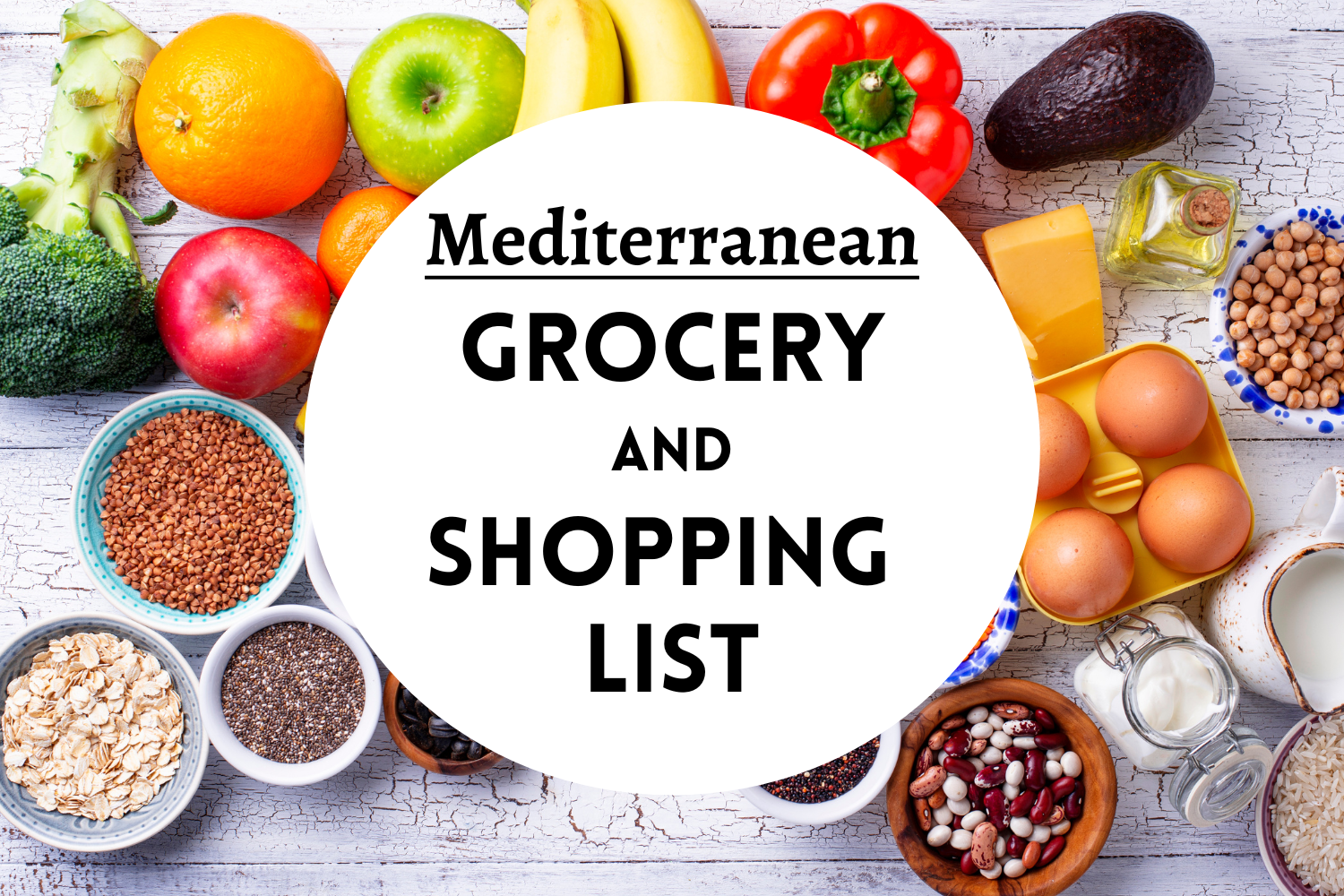
The best part about the Mediterranean diet is there’s nothing you can’t eat, as long as it’s the correct quantity and quality.
However, the Mediterranean diet traditionally incorporates many plant-based foods such as vegetables, fruits, legumes, nuts, and seeds as daily staples. Dairy, seafood, meat, wine, and sugary desserts are consumed only on special occasions or holidays.
Here’s the Mediterranean diet food pyramid that shows the breakdown of the foods to include in the Mediterranean diet and how often to consume them.
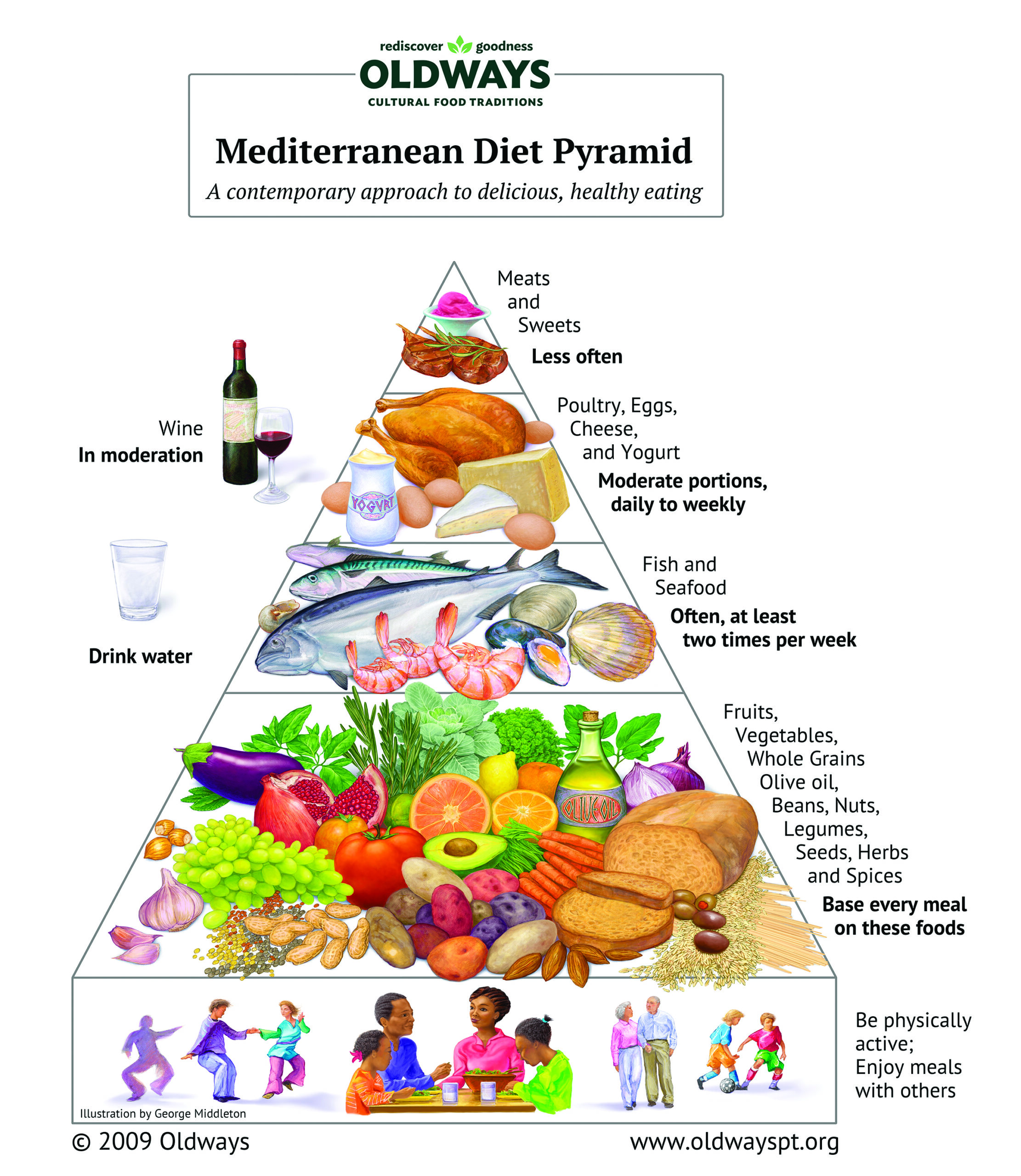
Courtesy of Oldways
And to understand what to stock in your kitchen, it’s good to have a sense of each of the basic ingredients. So let’s get started.
Extra virgin olive oil
A study of more than 7000 people on a Mediterranean diet, including extra-virgin olive oil for five years, showed the people had a 30% lower risk of heart diseases, a slower rate of cognitive decline, and better weight control.
To understand why virgin olive oil is good, we’ll first talk about what happens when cooking oil is exposed to heat. Olive oil is rich in unsaturated fats, which are known to support heart health and help maintain healthy cholesterol levels. Unlike saturated fat, which is found in many animal products and can raise the risk of heart disease, replacing saturated with unsaturated fats like those in olive oil can help reduce cardiovascular risk.
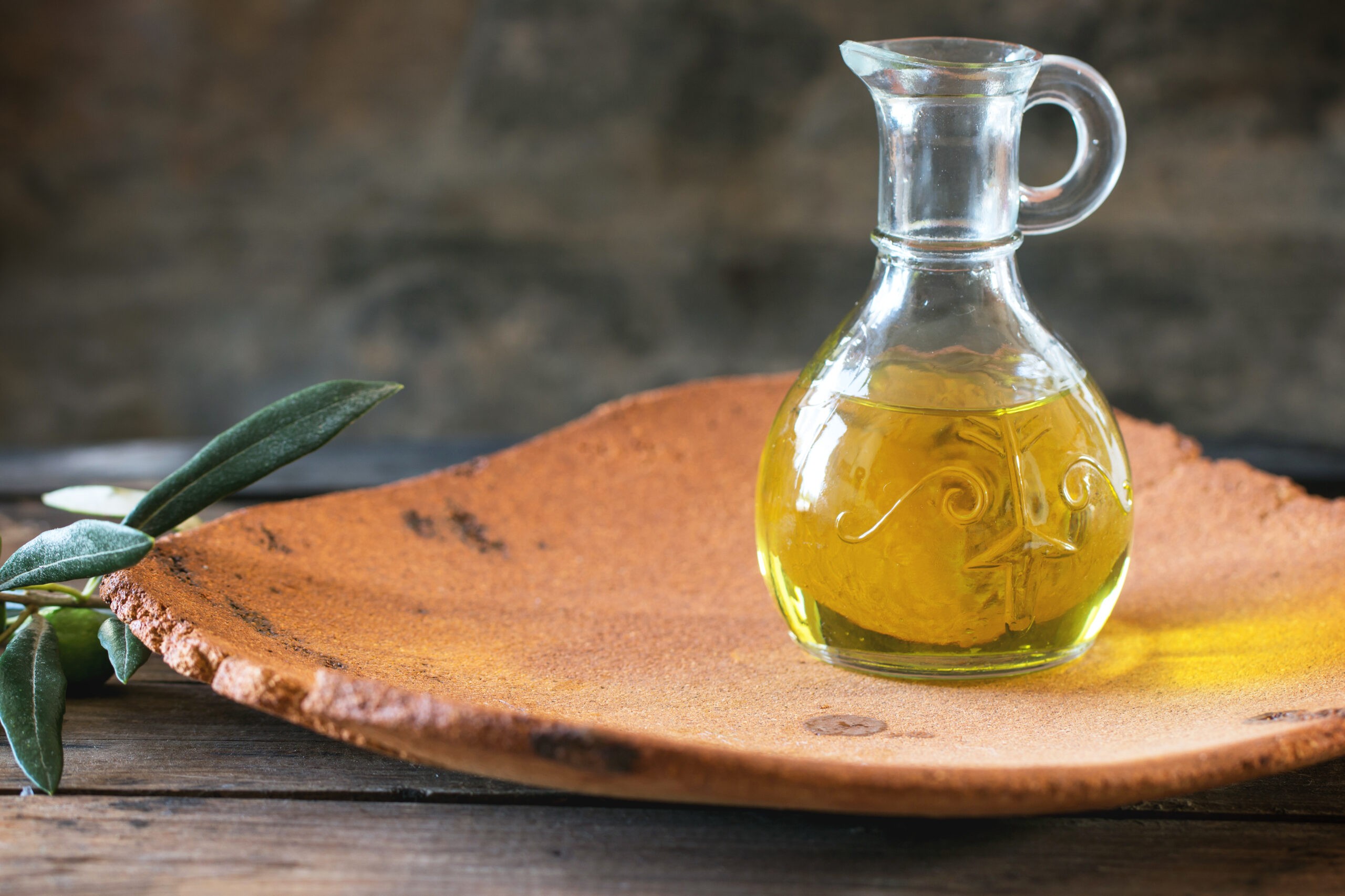
When oil is heated, it degrades and produces by-products, such as fatty acids, secondary oxidation products, polar compounds, etc. Some of these affect health adversely.
Extra-virgin olive oil produces the lowest levels of trans fats and harmful by-products when heated to high temperatures during cooking.
And how is extra virgin olive oil used in the Mediterranean diet?
- Generous drizzles over salads, salad dressings
- For high-heat cooking
- For saute
- For roasting
- Marinating meat and seafood
- In dips, such as hummus
Olive oil supports heart health and can help lower high cholesterol, making it a key part of the Mediterranean diet for reducing risk factors for heart disease and stroke.
Tips for buying and storing extra virgin olive oil:
- Use high-quality extra virgin olive oil when using uncooked (on salads or to dip bread).
- When cooking with olive oil, pay attention to its smoke point. (According to the International Olive Oil Council, olive oil has a high smoke point of about 410 degrees.) This is the point when it starts turning healthy fat into unhealthy.
- Buy a dark colored bottle.
- Store the oil in a cool, dark place.
- Secure the lid tightly to avoid oxidation.
- Avoid using too much.
- Avoid highly processed foods and oils; choose minimally processed extra virgin olive oil for maximum health benefits.
Mediterranean Diet Food List Printable PDF
This Mediterranean diet food list is available as a PDF file, and I recommend printing it out and putting it on your fridge. You will always have inspiration to eat these healthy foods whenever you go into the fridge.
If you’re looking for recipes to make with these foods, check out our extensive collection of Mediterranean Diet Recipes.
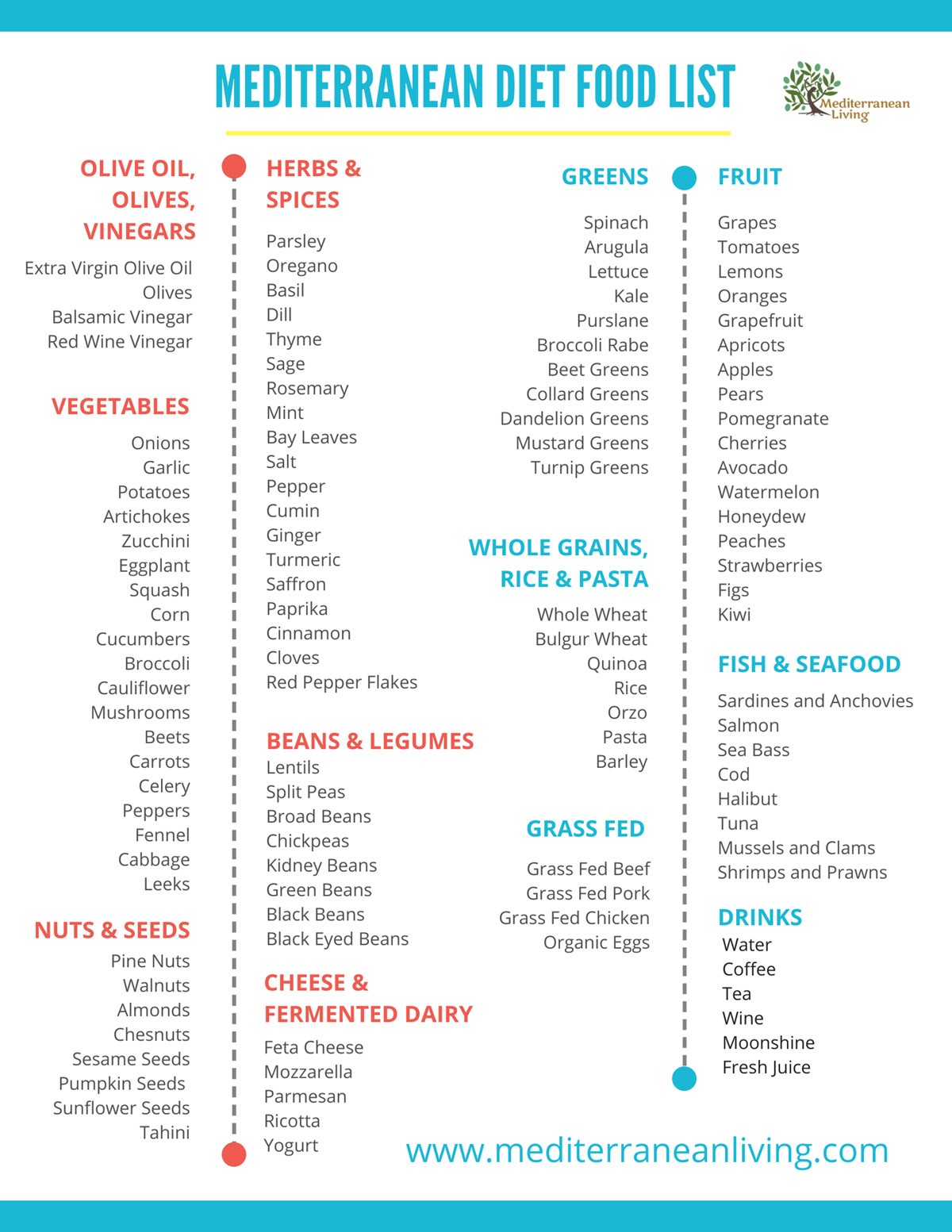
Whole grains
Another mainstay of the Mediterranean diet is whole grains—think whole grain bread, whole grains in salads, whole grain pasta, etc.
But first, let’s understand why you must choose whole grains and avoid refined alternatives.
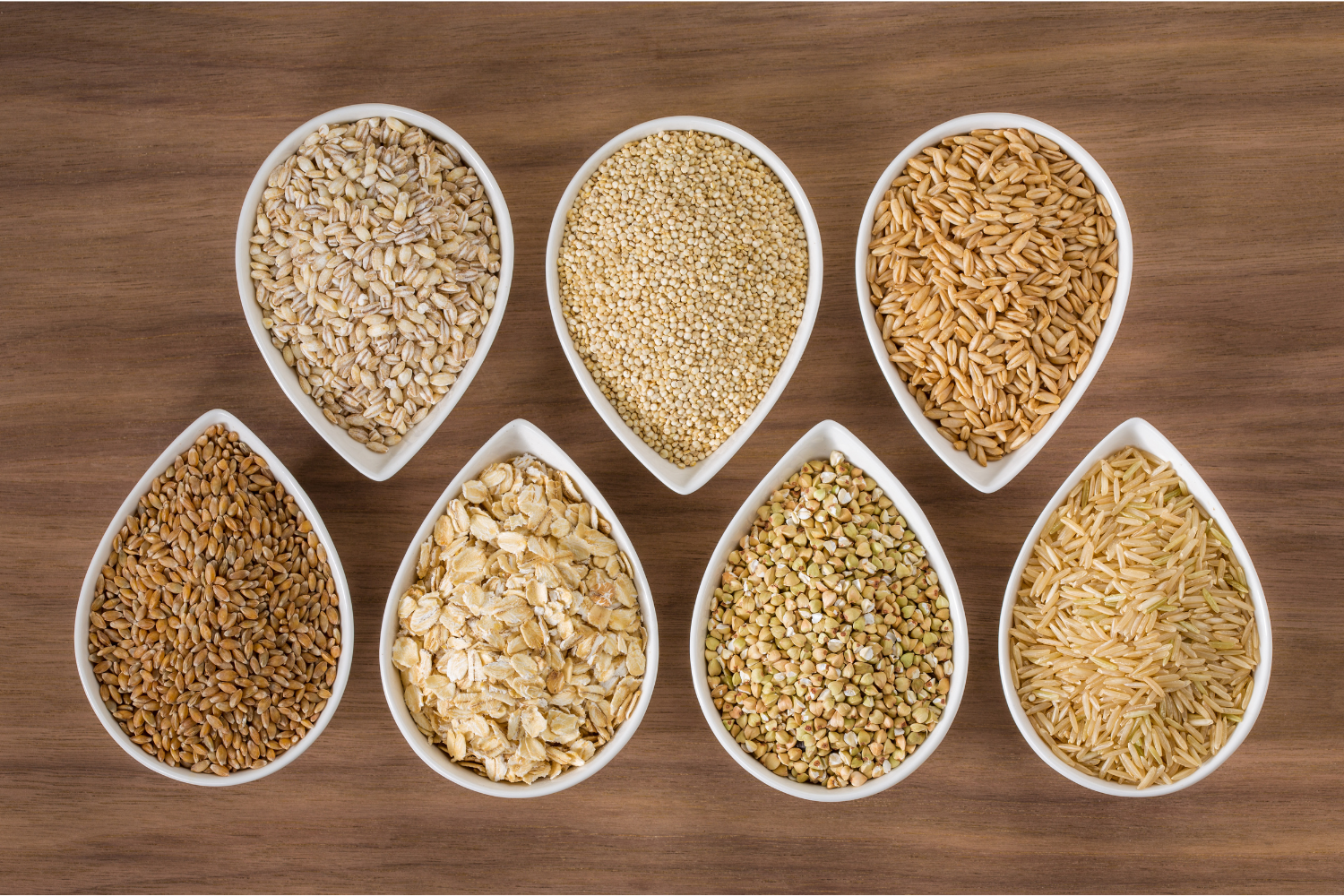
Whole grains contain fiber that slows digestion and keeps your stomach fuller for longer. Moreover, fiber also helps maintain blood sugar control.
Whole grains retain nutrients such as magnesium, potassium, and antioxidants. As a result, they help maintain blood sugar and blood pressure over time. Regular consumption of whole grains is linked to a lower risk of chronic diseases such as diabetes and cardiovascular disease. Whole grains also help reduce risk factors like high blood pressure and high cholesterol, which are associated with chronic disease prevention.
Whole grain kernels have all three essential parts—bran, endosperm, and germ, but refined grains only have the endosperm. Each of the three components provides nutrients.
Bran is rich in fiber, B vitamins, copper, zinc, iron, magnesium, antioxidants, and phytochemicals.
Germ is packed with healthy fats, vitamin E, B vitamins, antioxidants, and phytochemicals.
Endosperm provides carbohydrates, protein, and some amount of B vitamins and minerals.
Consuming whole grains has many benefits. First, it promotes weight loss—as it is fiber-rich, it makes you feel fuller for longer. In the long run, consistent whole grain consumption helps control blood sugar and blood pressure, which helps keep heart diseases at bay and supports the prevention and management of chronic diseases. Including whole grains in your eating pattern offers numerous health benefits.
A study of 18 years, published in the Journal of Nutrition, reveals that people who ate three or more servings of whole grain daily had a lower average increase in waist size than those who ate less than one-half serving.
Besides this, the increase in blood sugar levels and systolic blood pressure were lower in the former set of people even though they gained weight.
In what ways can you use whole grain in Mediterranean dishes?
- As a stuffing in vegetables
- Add to salads
- To thicken soups
- To make bread
- To make breakfast cereal base
Tip: Experiment with various whole grains that suit your taste, and mix them up from week to week.
Whole grains to add to your grocery list:
- Oats
- Brown rice
- Rye
- Barley
- Corn
- Buckwheat
- Couscous
- Quinoa
- Amaranth
Legumes
Legumes are an excellent way to add protein to the Mediterranean diet—they are affordable, have a long shelf life, and are easily available. Legumes are a key plant food in the Mediterranean eating pattern and are associated with a reduced risk of chronic diseases such as cardiovascular disease and diabetes.
The best part, they have a long shelf life, so you don’t have to worry about buying them fresh. Instead, you could buy them once and stock them for months.
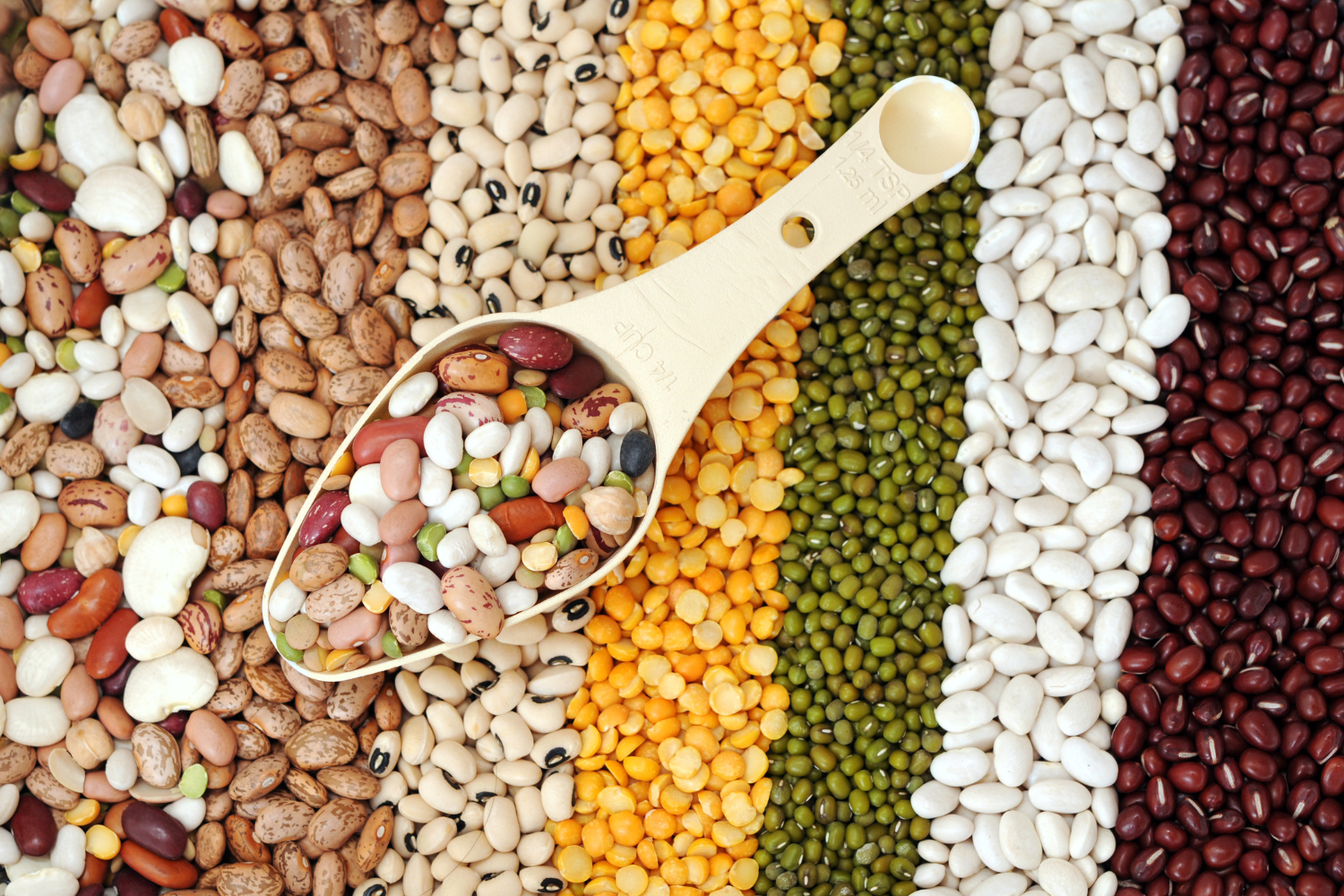
But here’s a fact—-many people tend to ignore legumes. Ingredients such as olive oil, vegetables, and protein-rich poultry and seafood are the highlights when talking about the Mediterranean diet.
However, legumes are an excellent combination of nutrients and protein. For example, a study found that Blue Zone regions—-areas identified by researchers as having the highest concentrations of centenarians—had people with the most extended lives who ate a cup of beans daily.
How to use legumes in Mediterranean diet cooking? Legumes and beans can be included in breakfast, snacks (think hummus made of different types of beans), or lunch and dinner (pasta with beans, salads). Incorporating legumes into your regular eating pattern is a simple way to boost your intake of plant foods and support optimal health.
- Lentil and bean soups
- Salads (bean salads, lentil salads)
- Stew
- Hummus
Legumes to add to your grocery list:
- Chickpea/ garbanzo
- Black, red, green, and yellow lentils
- Black, white, pinto bean
Kidney beans - Black-eyed peas
Vegetables
A weekly or twice-a-week vegetable shopping routine (if daily is not possible) is a must for those who want to follow the Mediterranean diet. The idea is to buy fresh harvest, grown locally and available seasonally.
Nutritionists recommend having five to six different colored vegetables daily. That’s because different colored vegetables have unique benefits. Bell peppers, in particular, are a versatile and nutritious ingredient in Mediterranean cuisine, perfect for salads, stir-fries, and stuffed vegetable dishes.
Including a variety of fruits and vegetables in your Mediterranean diet shopping list is essential for maximizing nutrition and health benefits.

Try this beautiful Tian Provencal with Zucchini and Tomatoes!
For example, green leafy vegetables such as spinach, kale, and collards are chock full of nutrients such as vitamin K, folate, lutein, etc. As a result, they effectively control inflammation and slow down cognitive decline caused by aging.
All types of greens provide different benefits—-so mix them up instead of consuming the same every time.
Whatever the color, all vegetables are a good source of dietary fiber. And high-fiber diets are associated with decreased risks of cancer.
Tip: Choose local, seasonal, organic, and fresh vegetables. When buying canned or frozen vegetables, check the labels to avoid added sugar and highly processed foods.
Add these vegetables to your grocery list:
- Tomato
- Broccoli
- Kale
- Spinach
- Onion
- Cauliflower
- Cabbage
- Carrot
- Brussels sprouts
- Cucumber
- Potato
- Sweet potato
- Turnip
- Arugula
- Asparagus
- Eggplant
- Mushroom
- Peppers
- Squash
- Zucchini
- Okra
Fruits
Traditionally, processed sweets are best avoided in the Mediterranean diet. Instead, fruits and berries take the place of dessert. Besides, fruits are used as sweeteners in cereal, yogurt, and snacks, making them a core part of a healthy eating plan.
Fruits grown locally can be consumed fresh because they don’t have to be transported. While it’s best to buy fresh fruit, studies say good quality fruit, when appropriately frozen, contains the same nutrients. This means you could add frozen fruit to your grocery list, but always check labels to avoid added sugar in processed or packaged options.
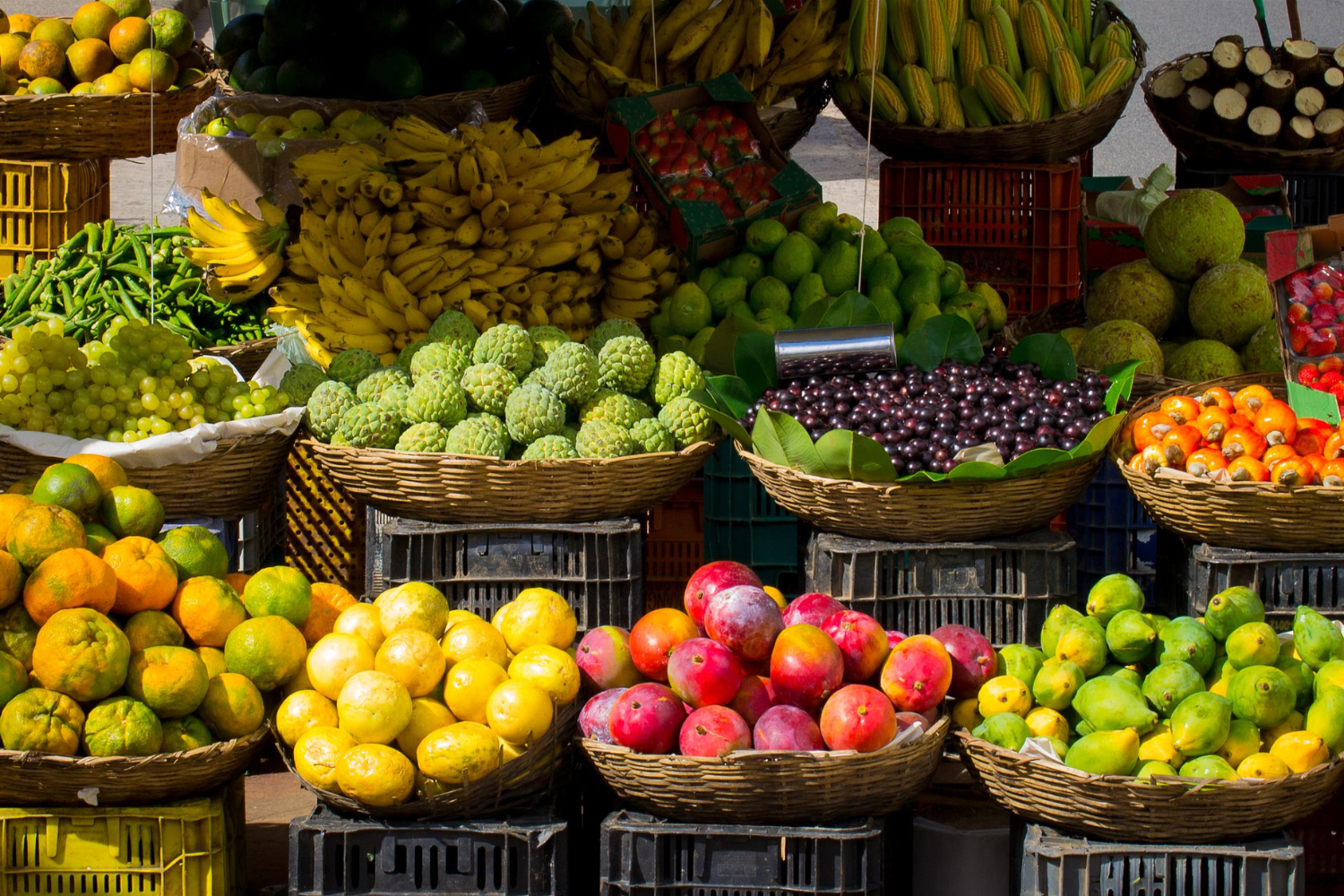
The World Health Organization (WHO) recommends eating 400 g or five portions of fruits and vegetables daily. It helps receive adequate dietary fiber and reduces the risk of non-communicable diseases.
Tips:
- Experts recommend three servings of fruit per day, one serving being half a cup to one full cup.
- Incorporate more fruits, such as berries, citrus, and stone fruits, to enhance the health benefits and flavor of your Mediterranean diet.
- Try new fruits every time you go grocery shopping.
- Include fruit at breakfast, lunch, and dinner recipes, and mid-meal snacks.
-
Choose fresh or frozen fruit without added sugar to maximize nutritional benefits.
Fruits to include in your grocery shopping list:
- Apple
- Banana
- Orange
- Apricot
- Blueberry
- Grapefruit
- Plum
- Pear
- Strawberry
- Pomegranate
- Tangerine
- Tomato
- Grapes
- Date
- Fig
- Melon
- Peach
- Cherry
- Avocado
Trivia
Tomato and avocado are considered both fruit and vegetable.
Nuts and Seeds
One of the quickest fixes for snacking is nuts and seeds. As important plant foods in the Mediterranean diet, they are fundamental building blocks of meals. A handful is enough to make your stomach feel full. Nuts and seeds are excellent sources of heart healthy fats, which support cardiovascular health.
Nuts and seeds can be consumed daily. Research shows nut consumption is associated with a reduced risk of cardiovascular disease and longevity.
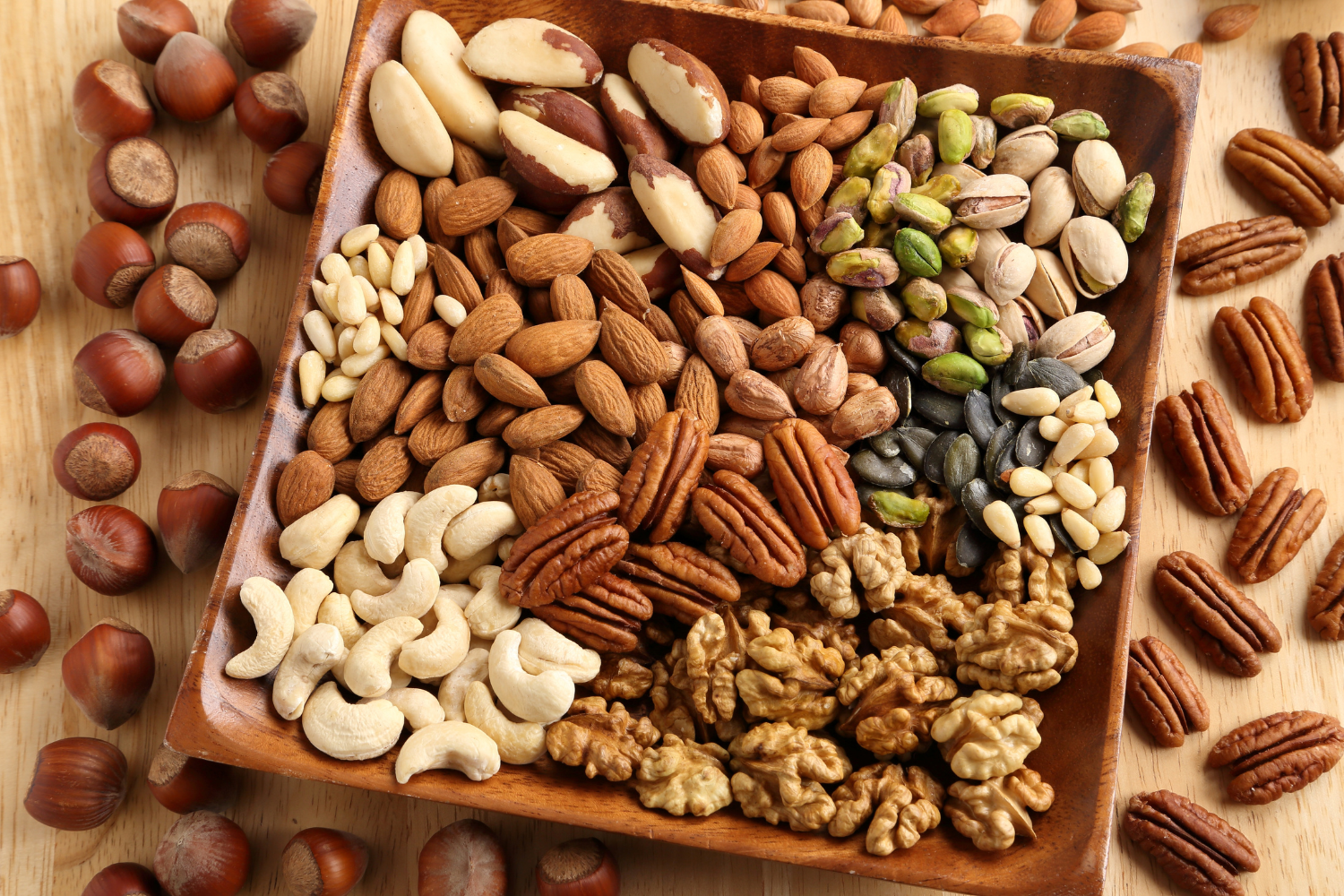
For vegetarians, walnuts are a good source of plant-based omega-3 fats.
Sesame seeds come in different varieties of colors and textures. First, look for unhulled sesame seeds. Just like whole grain, the bran is removed in hulled seeds, taking away nutrition—we’re talking calcium, zinc, fiber, iron, and phosphorus.
An excellent source of vitamin E, sunflower seeds are known to help reduce the development of diabetic conditions and prevent cardiovascular disease.
How to incorporate nuts into your daily diet?
- Have a mix of nuts as a snack
- Mix them in dips or pesto sauces
- Sprinkle on salads
- Add them to breakfast cereal
- Sprinkle them over dessert
- Make nut butters
Tip: Replace snacks high in saturated fat, such as chips or pastries, with nuts and seeds for better heart health. Keep different nuts in small bags or boxes and freeze them. They will remain fresh for a long time.
Include these nuts and seeds in your grocery list:
Nuts
- Walnuts
- Almond
- Macadamia
- Cashew
- Hazelnut
- Apricot
- Fig
Seeds
- Chia
- Flax
- Hemp
- Amaranth
- Pumpkin
- Sunflower
- Poppy
- Sesame
Seafood
Another source of healthy fats when on a Mediterranean diet is seafood—usually consumed once or twice a week. Among fish, those rich in omega-3 fatty acids are the best—salmon, sardines, herring, mackerel, tuna, and lake trout.
Choosing fish over red meat helps reduce saturated fat intake, which can lower the risk of heart attack and other cardiovascular diseases.
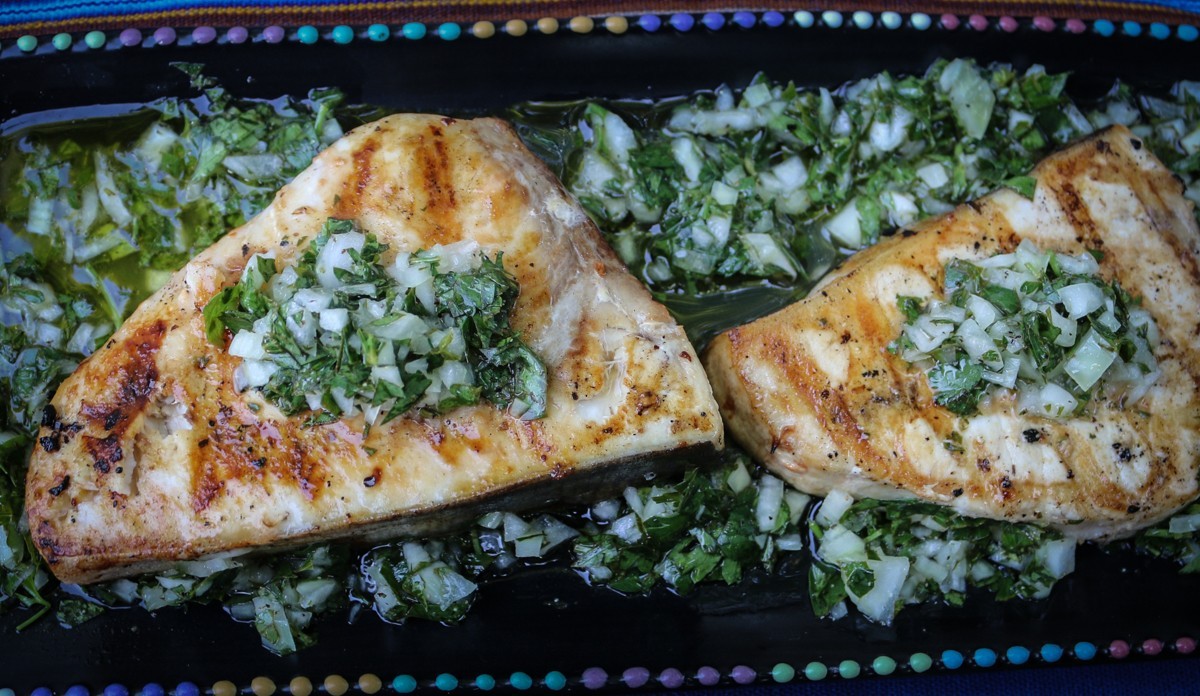
Try this yummy Grilled Swordfish with Lemon and Parsley!
Omega-3 fatty acids are polyunsaturated fats that help fight inflammation, reduce blood clotting, decrease triglycerides, and reduce the risk of heart ailments.
Tip: Learn to identify fresh fish. Pick fish rich in omega-3 fatty oil.
Fishes to add to your grocery list:
- Salmon
- Tuna
- Shrimp
- Clams
- Crab
- Oysters
- Octopus
- Mackerel
- Mussels
- Flounder
- Cod
- Sardine
- Trout
Poultry
Hand-picked your favorite seafood? Now it’s time to stock up on some poultry.
Eggs are consumed in moderate amounts—typically once or twice a week. Similarly, poultry is also enjoyed in moderate amounts as part of the Mediterranean diet. Both eggs and poultry are lower in saturated fat compared to red meat, making them a healthier choice for supporting heart health. That said, traditionally, eggs played an important role.
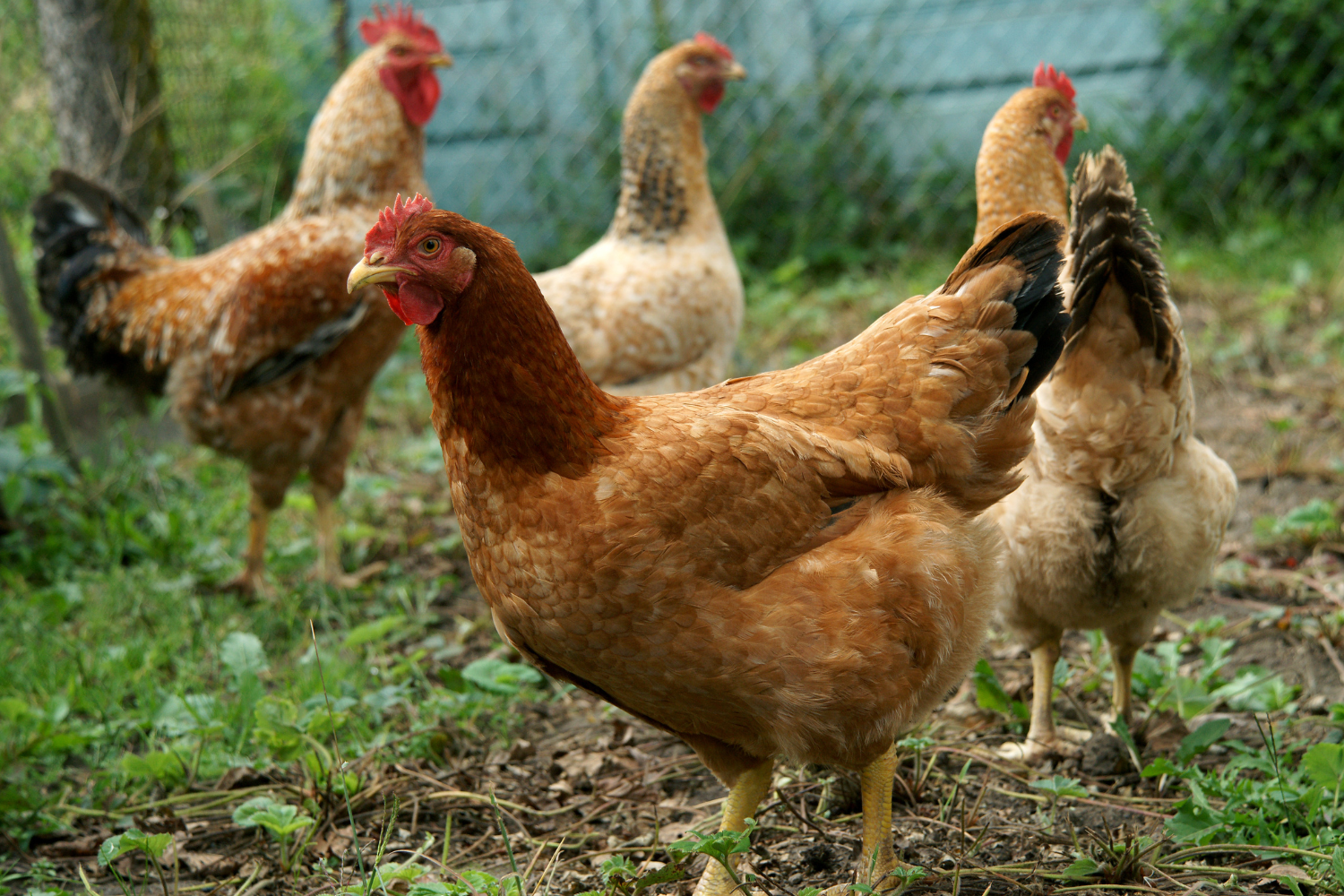
As meat is consumed extremely carefully in the diet, eggs have been the go-to source of protein. Besides protein, eggs are packed with B vitamins, minerals, and antioxidants and are low in calories. They can be consumed for breakfast, lunch, or dinner.
The best part about eggs is that you can stock up a dozen or two to last weeks. So you need not have to add it to your grocery list now and then—buy them once and stock them in your fridge.
Types of eggs to add to your grocery list:
- Chicken egg
- Quail egg
- Duck egg
Trivia: How to identify fresh eggs?
Fresh eggs sink in water. As the egg ages, the small air pocket inside it grows larger and floats.
Meat
Meat consumption was traditionally restricted to once a week. It is mainly prepared on Sundays, holidays or celebratory occasions. The meats most common to the Mediterranean diet are chicken, beef, pork, veal, and lamb. Even now, beans are eaten more than meat to provide protein.
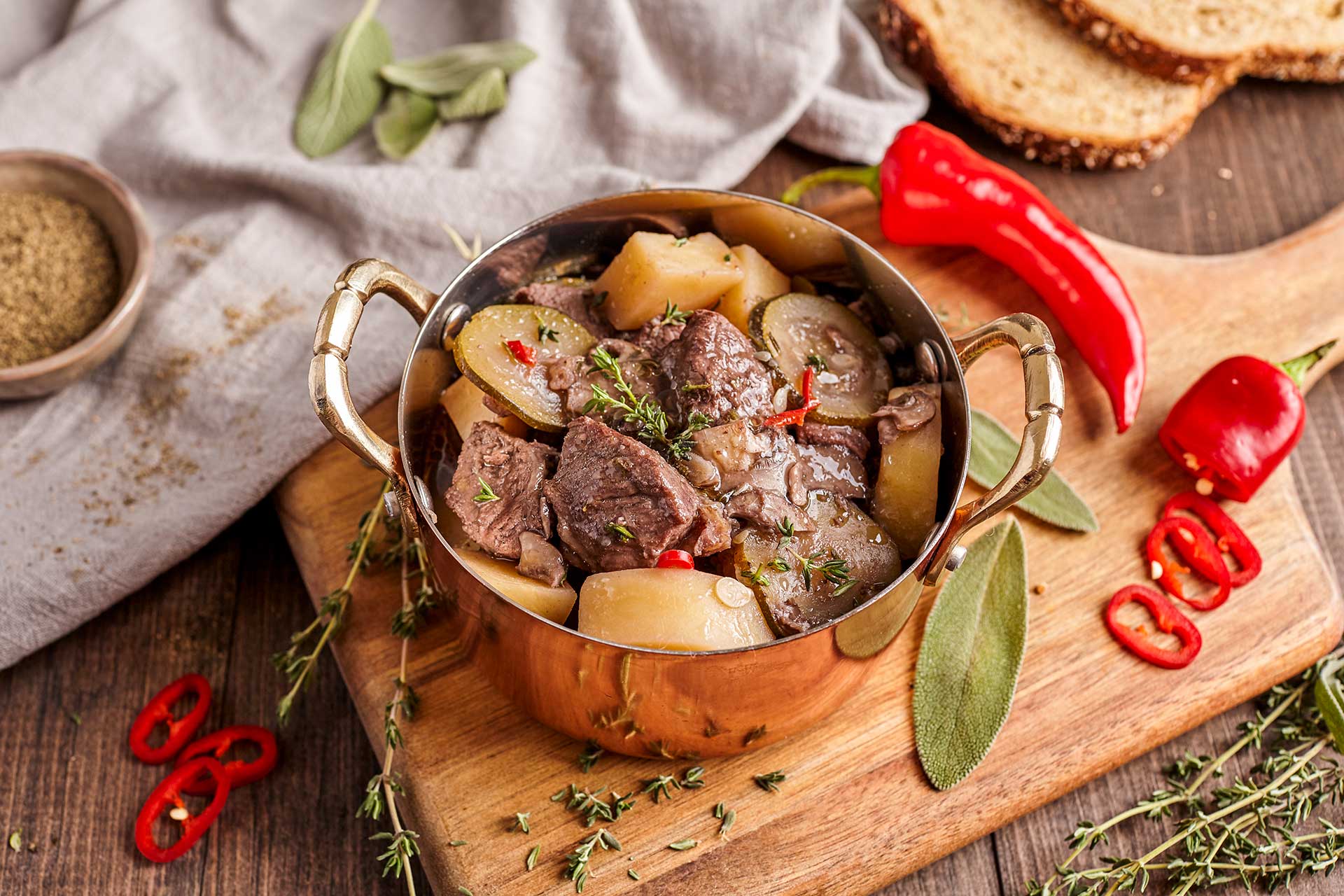
Try this delicious Instant Pot Beef Stew with Sage and Red Wine!
Chicken, like red meat, is a high-quality protein and is eaten on occasion in the Mediterranean Diet. In the Mediterranean, they are more likely to eat every part of the chicken than just chicken breast. Even the bones are used to make chicken broth.
Tips:
- Eat small portions
- Treat meat as a condiment, rather than a main dish
- Roast, steam, sauté instead of deep fried
- Choose grass-fed meat when possible
- Limit red meat consumption to reduce saturated fat intake and support heart health
Dairy
Dairy products are consumed in small portions in the Mediterranean diet. That’s because they’re full-fat. While full-fat dairy contains saturated fat, it should be consumed in moderation as part of a balanced Mediterranean diet.
Dairy products are a good source of calcium—which is essential for bone and heart health. Dairy consumption mostly includes yogurt and cheese, but that doesn’t mean there’s no variety. Both yogurt and cheese are available in a range of flavors.
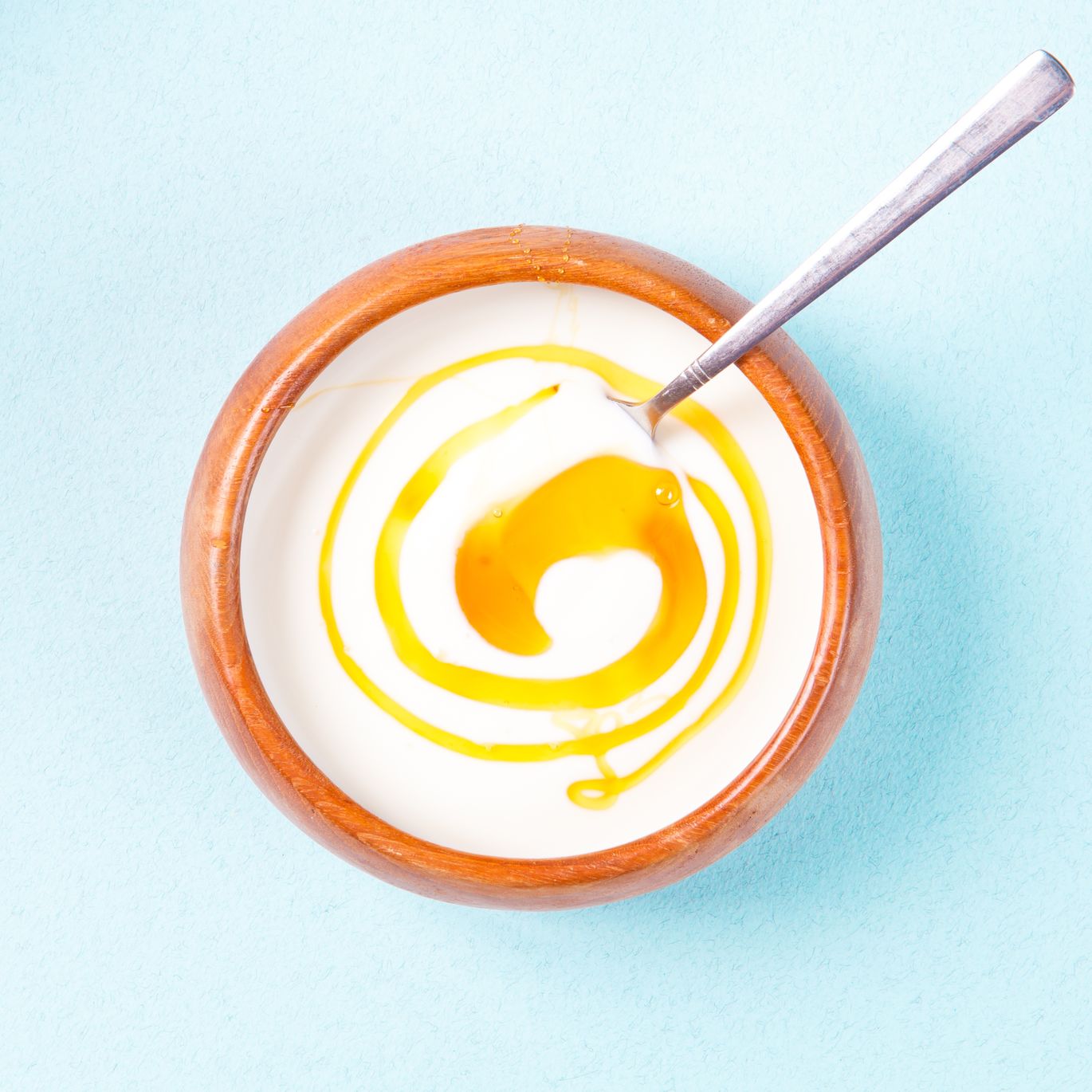
Yogurt is fermented and an excellent source of gut-healthy probiotics. Greek yogurt is the best option, but it’s best to choose plain to avoid added sugar. Flavored yogurt might contain high sugar content or added sugar.
When it comes to cheese, there’s feta, parmesan, brie, ricotta, halloumi, and chevre, among others. Feta cheese, a traditional Greek cheese, is commonly used in classic Mediterranean dishes like Greek salad, stews, and fish recipes for its distinctive flavor and versatility.
Include these in your grocery shopping list:
- Greek yogurt
- Cheese – feta, parmesan
- Milk
- Kalamata olives are also a flavorful, heart-healthy addition to salads and other Mediterranean recipes.
Spices
No grocery list is complete without spices. And Mediterranean cuisine is known to be as tasty as it is healthy. And that’s because of the spices.
Not only do the spices easily transform bland vegetables into flavorful dishes, but aromatic spices also reduce the need to add too much salt to the dishes. Besides, herbs contain powerful compounds that prevent diseases and promote health. Fresh herbs are especially valued in Mediterranean cooking for enhancing flavor and providing healthy seasoning options, whether used in homemade sauces or as vibrant garnishes.
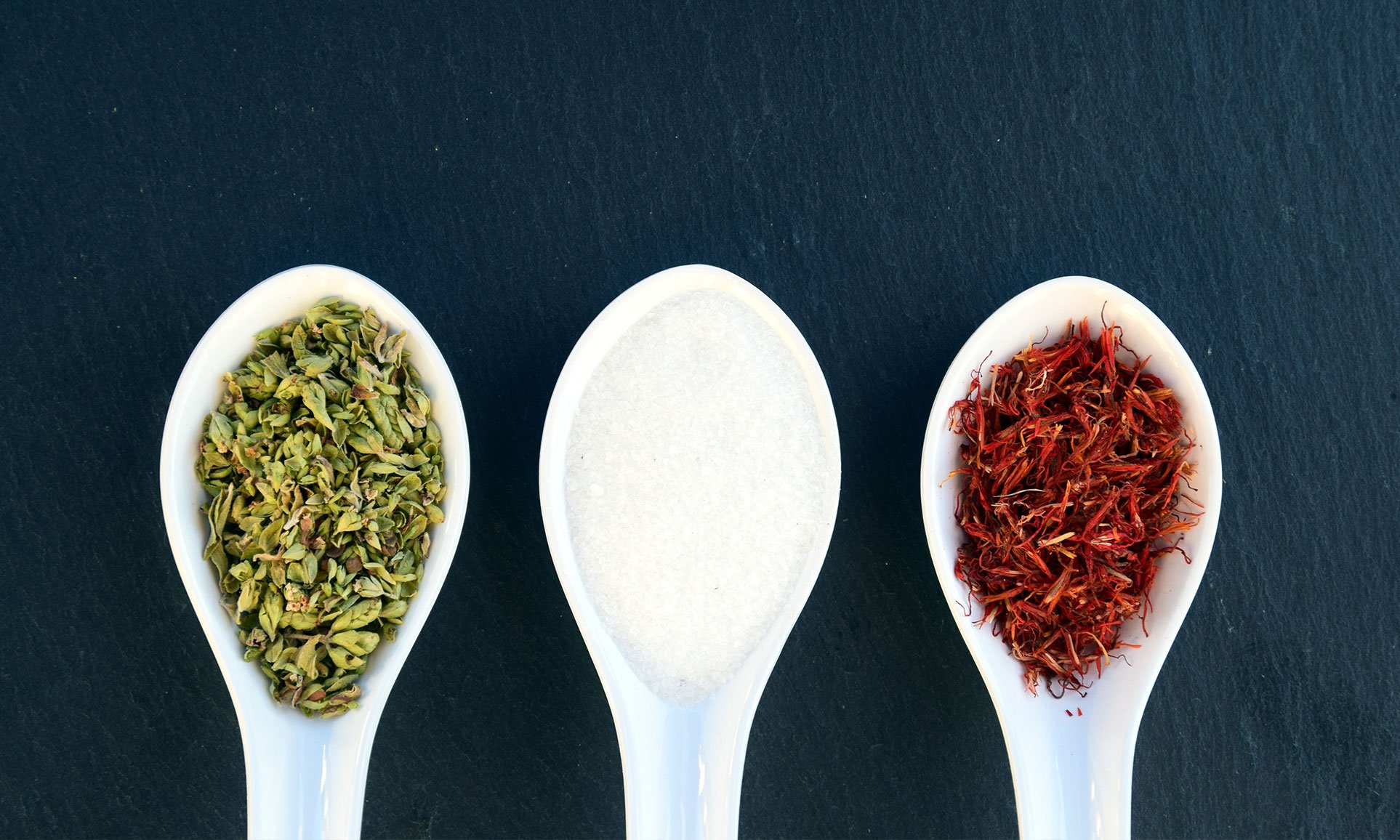
The good part is the list of Mediterranean cuisine spices is long enough, including fresh and dried varieties.
Tip: Flavor the food with more spices, so you’d need to add less salt.
Include these spices in your grocery shopping list:
- Parsley
- Garlic
- Basil
- Cumin
- Mint
- Oregano
- Rosemary
- Nutmeg
- Bay leaf
- Cinnamon
- Pepper
- Saffron
- Cilantro
- Dill
- Thyme
Are you ready to start the Mediterranean way of life? With this grocery shopping list, you’re one step closer to your Mediterranean diet goals.
But remember, the Mediterranean diet isn’t only about what you eat; it’s also about staying active and happy, exercising, and sharing meals with loved ones.
Happy shopping!









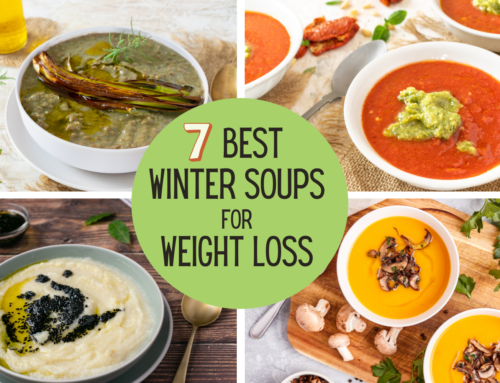
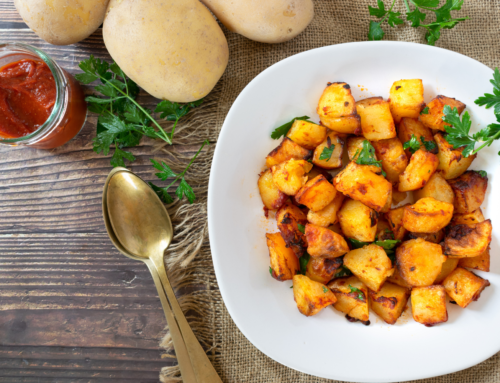
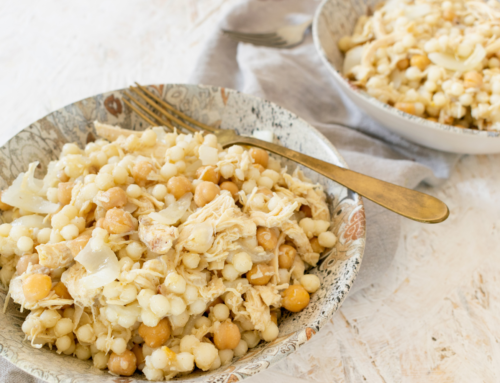
I have been on the diet for two years and have lost 50 pounds with diet and exercise. I have 10 to go and I love this lifestyle change. For me it is a way of life and not a diet that I will quit when I finish my weight loss. Thanks for the inspiration.
I have been wanting to start the Mediterranean diet for so long. I’ll finally be in a place to do so in a few weeks.
Great stuff! I’m 64, constant afib, high blood pressure and an aortic aneurysm! My cardiologist recommended the Mediterranean diet. You rock!
Just started this diet. Loving the food.
Can you have mozzarella cheese sticks